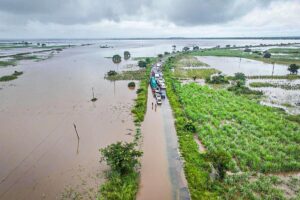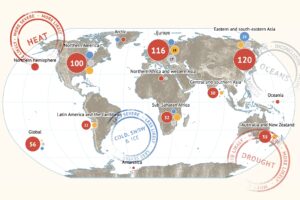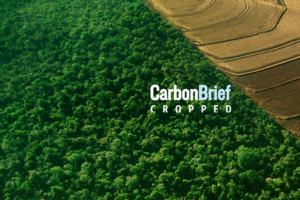We handpick and explain the most important stories at the intersection of climate, land, food and nature over the past fortnight.
This is an online version of Carbon Brief’s fortnightly Cropped email newsletter. Subscribe for free here.
Key developments
Forest fund delays and cuts
TFFF BEHIND SCHEDULE: Brazil’s flagship forest fund, the Tropical Forest Forever Facility (TFFF), is “running behind schedule as officials deliberate on how to structure the complex financial vehicle” in time for COP30, Bloomberg reported. The “ambitious” fund aims to raise $125bn to help countries protect rainforests “using investment returns from high-yielding fixed-income assets”, it explained. However, the outlet reported that investor events have either not been held or cancelled, while officials are still mulling “possible structures” for the fund.
CUTS DEEP: Environmentalists fear that “sweeping spending cuts for forest protection” by Argentina’s “pro-business libertarian” president, Javier Milei, could endanger the country’s forests, Climate Home News reported. The impacts of these cuts are “already becoming evident”, contributing to deforestation – particularly in the northern Gran Chaco region, environmentalists told the outlet. According to Argentine government data, the country lost about 254,000 hectares of forest nationwide in 2024. Milei – who has said he wants to withdraw Argentina from the Paris Agreement – faces a “crucial midterm election” in October that could make environmental deregulation even easier, the outlet wrote.
BANKING ON THE AMAZON: A new report found that 298 banks around the world “channelled $138.5bn” to companies developing new fossil-fuel projects in Latin America and the Caribbean, Mongabay reported. The experts behind the study told the outlet: “Some major banks have adopted policies to protect the Amazon, but these have had little impact, as they do not apply to corporate-level financing for oil and gas companies operating in the Amazon.” Mongabay approached every bank, but only JPMorgan Chase responded, declining to comment.
-
Sign up to Carbon Brief’s free “Cropped” email newsletter. A fortnightly digest of food, land and nature news and views. Sent to your inbox every other Wednesday.
‘Green to grey’
‘600 FOOTBALL PITCHES’: Europe is losing “green space…at the rate of 600 football pitches a day”, according to a new, cross-border investigation by the “Green to Grey Project”, the Guardian reported. The outlet – part of the Arena for Journalism in Europe collaboration of journalists and scientists behind the project – added that Turkey accounted for more than a fifth of the total loss in Europe. While nature “accounts for the majority of the losses”, the research showed that the EU is also rapidly building on agricultural land, “with grave consequences for the continent’s food security and health”, it continued.
‘TWICE AS HIGH’: Conducted by 40 journalists and scientists from 11 countries, the investigation found that the “natural area” lost to construction in the EU was “twice as high as official estimates”, Le Monde reported. Despite Brussels setting a 2011 target to “reduce the EU’s yearly land take” to 800km2 – “more than 100,000 football fields” – the EU is “artificialising more than 1,000km2 of land per year”, it added.
KEY DRIVERS: While the “main drivers of land loss across Europe” are housing and road-building, Arena for Journalism in Europe found many instances of construction “that serve only a minority or that are not built based on public need”, such as luxury tourism sites. Between 2018 to 2023, “an area the size of Cyprus” in nature and cropland was lost to construction, they added. Researchers who “scrutinised millions of pixels in search of lost natural areas” found that Finland’s tourism boom is “encroaching on the last remaining sanctuaries” in Lapland, another Le Monde story reported.
News and views
‘INTRACTABLE’ OFFSETS: A new review paper found that the failure of carbon offsets to cut emissions is “not due to a few bad apples”, but “down to deep-seated systemic problems that incremental change will not solve”, the Guardian wrote. Study co-author Dr Stephen Lezak told the outlet: “We have assessed 25 years of evidence and almost everything up until this point has failed.” The worst of these “intractable problems” were with “issuing additional credits” for “non-additional”, “impermanent” and double-counted projects, the Guardian noted.
INSTITUTIONALISING AGROECOLOGY: The Cuban government issued a national decree providing a “more explicit legal framework” for the implementation of agroecological principles across the country, according to a release from the Caribbean Agroecology Institute. The decree also announced a new national fund for promoting agroecology. Yamilé Lamothe Crespo, the country’s deputy director of science, innovation and agriculture, “emphasised that agroecology is a model capable of responding to the global climate crisis”, teleSUR reported.
ZERO PROGRESS TO ZERO HUNGER: The world has “made no improvement” towards achieving the “zero hunger” Sustainable Development Goal since it was set in 2015, according to a new report from the UN Food and Agriculture Organization. The report said that “ongoing geopolitical tensions and weather-related disruptions” have contributed to “continued instability in global food markets”. Separately, a new report from the Energy and Climate Intelligence Unit thinktank estimated that a “year’s worth of bread” has been lost in the UK since 2020 due to extreme weather impacting wheat harvests, the Guardian reported.
MEATLESS MEDIA: More than 96% of analysed climate news stories across 11 (primarily US-based) outlets “made no mention of meat or livestock production as a cause of climate change”, according to analysis by Sentient Media. Sentient, a not-for-profit news organisation in the US, looked at 940 stories to assess the reported causes of greenhouse gas emissions. Around half of the stories included mention of fossil fuels, it said. Covering the report, the Guardian wrote: “The data reveals a media environment that obscures a key driver of the climate crisis.”
FRAUGHT PATH: One-fifth of migratory species “face extinction from climate change”, according to a new report by the UN’s migratory species convention, covered by Carbon Copy. The “warning” comes as climate change and extreme weather are “altering their ranges [and] shrinking habitats”, the Mail & Guardian wrote. Oceanographic Magazine noted that the North Atlantic right whale is “forced to make migratory detours into dangerous pockets of the ocean” due to warming seas. Down to Earth reported that the range of Asian elephants is “shifting east” in “response to anthropogenic land-use and climate change”.
GOODBYE, GOODALL: Dr Jane Goodall, the groundbreaking English primatologist, died at the age of 91 last week. BBC News noted that Goodall “revolutionised our understanding” of chimpanzees, our “closest primate cousins. The outlet added that she “never wavered in her mission to help the animals to which she dedicated her life”. CNBC News reported that Goodall followed a vegan diet due to factory farming and the “damage done to the environment by meat production”. She also “encouraged” others to follow her example, the outlet said.
Spotlight
What the US government shutdown means for food, forests and climate
This week, Carbon Brief explains the US government shutdown – now in its second week – and its implications for food, forests, public lands and climate change.
The US federal government shut down at 12:01 eastern daylight time on 1 October, as Congress failed to agree on a bill to keep funding the government and its services.
This is the 11th time that the government has shut down in such a fashion; previous shutdowns have lasted anywhere from a few hours to longer than a month.
As a result of the shutdown, 750,000 federal employees have been furloughed, or placed on unpaid leave. Others, whose work has been deemed “essential”, are working without pay.
(A law passed during a shutdown in US president Donald Trump’s first term guarantees back pay and benefit accrual for furloughed employees. However, the White House has argued that the law does not necessarily guarantee these benefits.)
Some agencies have seen close to 90% of their employees furloughed.
With a reopening date uncertain, Carbon Brief explored what the shutdown means for food, forests and climate.
Food and farming
According to the agency’s “lapse of funding” plan, the US Department of Agriculture (USDA) planned to furlough about half of its employees for the duration of the shutdown.
Among the activities put on hold during the funding lapse are the disbursement of disaster-assistance payments for farmers impacted by extreme weather events. The Farm Service Agency, which oversees these payments, will also not process any new loans during the shutdown, such as those that provide assistance to farmers during the harvest.
The Natural Resources Conservation Service, an arm of the USDA with a mission to help private landowners “restore, enhance and protect forestland resources”, has seen more than 95% of its staff furloughed, effectively halting all conservation efforts within the agency.
Certain animal-health programmes – such as the one addressing the highly pathogenic avian influenza outbreak – will continue, but others will shutter for the duration of the funding lapse. Long-term research on animal and plant diseases will also cease.
Forests and fires
The US Forest Service falls under the purview of the USDA. Employees responsible for “responding [to] and preparing for wildland fires” will continue to work during the shutdown; however, “hazardous fuels treatments” – such as prescribed burns or pruning to reduce fuel loads – will be reduced under the agency’s plan. Furthermore, state grants for fire preparedness and forest management “may be delayed”.
Work on forest restoration projects may potentially continue “on a case-by-case basis”, the plan said.
The Bureau of Land Management (BLM), a subdivision of the Department of the Interior, will furlough around 43% of its employees, according to its contingency plan. Staff dedicated to fire management will continue to work while “carryover balances” are available, but the number of staff working will be reduced once these funds are exhausted.
Climate change and research
Across the federal government, most research activities are being put on hold, including conference travel and the issuing of new grants.
Grant recipients may continue carrying out research “to the extent that doing so will not require federal staff” and while funds are available, according to the National Science Foundation’s operational plan. This does not include researchers at federal agencies, such as the Environmental Protection Agency, US Geological Survey and the National Oceanic and Atmospheric Administration (NOAA).
The funding-lapse plan set out by the Department of Commerce said that NOAA will continue its prediction and forecasting activities, as well as maintain “critical and mission-related” programmes related to research satellites. However, “most research activities” will cease.
Similarly, NASA’s shutdown plan indicates continuing support for satellite operations, but a pause on research activities – except for those “aligned with presidential priorities”.
Watch, read, listen
MORAINE DILEMMA: A new PBS documentary walked through ancient Inca paths in the Andes to understand how modern communities are confronting the loss of Peru’s glaciers.
SUBSIDISING ‘EXPLOITATION’: A DeSmog investigation revealed how farmers convicted of “exploiting migrant workers” continue to claim “millions in taxpayer-funded subsidies”.
GROUND TRUTHING: A podcast from the Hindu looked back at 20 years of India’s Forest Rights Act, meant to “address historic injustices” towards the country’s Indigenous communities.
DEEP DIVE MANUAL: Mongabay journalists shared how they investigated Brazil’s shark-meat purchases that were subsequently served in schools, prisons and hospitals.
New science
- The frequency of “economically disastrous” wildfires increased sharply after 2015, with the highest disaster risk in “affluent, populated areas” in the Mediterranean and temperate regions | Science
- A “strictly protected” forest in Tuscany had maximum summertime temperatures that were, on average, nearly 2C cooler than those of nearby productive forests over 2013-23 | Agricultural and Forest Meteorology
- Between 2010 and 2020, the water consumed by global crop-growing increased by 9%, putting “additional pressure on limited water resources” | Nature Food
In the diary
- 9-15 October: 2025 World Conservation Congress of the International Union for Conservation of Nature (IUCN) | Abu Dhabi, United Arab Emirates
- 10-17 October: World Food Forum 2025 | Rome
- 16 October: World Food Day | Global
- 25 October: Ivory Coast presidential election
Cropped is researched and written by Dr Giuliana Viglione, Aruna Chandrasekhar, Daisy Dunne, Orla Dwyer and Yanine Quiroz. Please send tips and feedback to cropped@carbonbrief.org
The post Cropped 8 October 2025: US government shutdown; EU loses green space; Migratory species extinction threat appeared first on Carbon Brief.
Greenhouse Gases
DeBriefed 27 February 2026: Trump’s fossil-fuel talk | Modi-Lula rare-earth pact | Is there a UK ‘greenlash’?
Welcome to Carbon Brief’s DeBriefed.
An essential guide to the week’s key developments relating to climate change.
This week
Absolute State of the Union
‘DRILL, BABY’: US president Donald Trump “doubled down on his ‘drill, baby, drill’ agenda” in his State of the Union (SOTU) address, said the Los Angeles Times. He “tout[ed] his support of the fossil-fuel industry and renew[ed] his focus on electricity affordability”, reported the Financial Times. Trump also attacked the “green new scam”, noted Carbon Brief’s SOTU tracker.
COAL REPRIEVE: Earlier in the week, the Trump administration had watered down limits on mercury pollution from coal-fired power plants, reported the Financial Times. It remains “unclear” if this will be enough to prevent the decline of coal power, said Bloomberg, in the face of lower-cost gas and renewables. Reuters noted that US coal plants are “ageing”.
OIL STAY: The US Supreme Court agreed to hear arguments brought by the oil industry in a “major lawsuit”, reported the New York Times. The newspaper said the firms are attempting to head off dozens of other lawsuits at state level, relating to their role in global warming.
SHIP-SHILLING: The Trump administration is working to “kill” a global carbon levy on shipping “permanently”, reported Politico, after succeeding in delaying the measure late last year. The Guardian said US “bullying” could be “paying off”, after Panama signalled it was reversing its support for the levy in a proposal submitted to the UN shipping body.
Around the world
- RARE EARTHS: The governments of Brazil and India signed a deal on rare earths, said the Times of India, as well as agreeing to collaborate on renewable energy.
- HEAT ROLLBACK: German homes will be allowed to continue installing gas and oil heating, under watered-down government plans covered by Clean Energy Wire.
- BRAZIL FLOODS: At least 53 people died in floods in the state of Minas Gerais, after some areas saw 170mm of rain in a few hours, reported CNN Brasil.
- ITALY’S ATTACK: Italy is calling for the EU to “suspend” its emissions trading system (ETS) ahead of a review later this year, said Politico.
- COOKSTOVE CREDITS: The first-ever carbon credits under the Paris Agreement have been issued to a cookstove project in Myanmar, said Climate Home News.
- SAUDI SOLAR: Turkey has signed a “major” solar deal that will see Saudi firm ACWA building 2 gigawatts in the country, according to Agence France-Presse.
$467 billion
The profits made by five major oil firms since prices spiked following Russia’s invasion of Ukraine four years ago, according to a report by Global Witness covered by BusinessGreen.
Latest climate research
- Claims about the “fingerprint” of human-caused climate change, made in a recent US Department of Energy report, are “factually incorrect” | AGU Advances
- Large lakes in the Congo Basin are releasing carbon dioxide into the atmosphere from “immense ancient stores” | Nature Geoscience
- Shared Socioeconomic Pathways – scenarios used regularly in climate modelling – underrepresent “narratives explicitly centring on democratic principles such as participation, accountability and justice” | npj Climate Action
(For more, see Carbon Brief’s in-depth daily summaries of the top climate news stories on Monday, Tuesday, Wednesday, Thursday and Friday.)
Captured
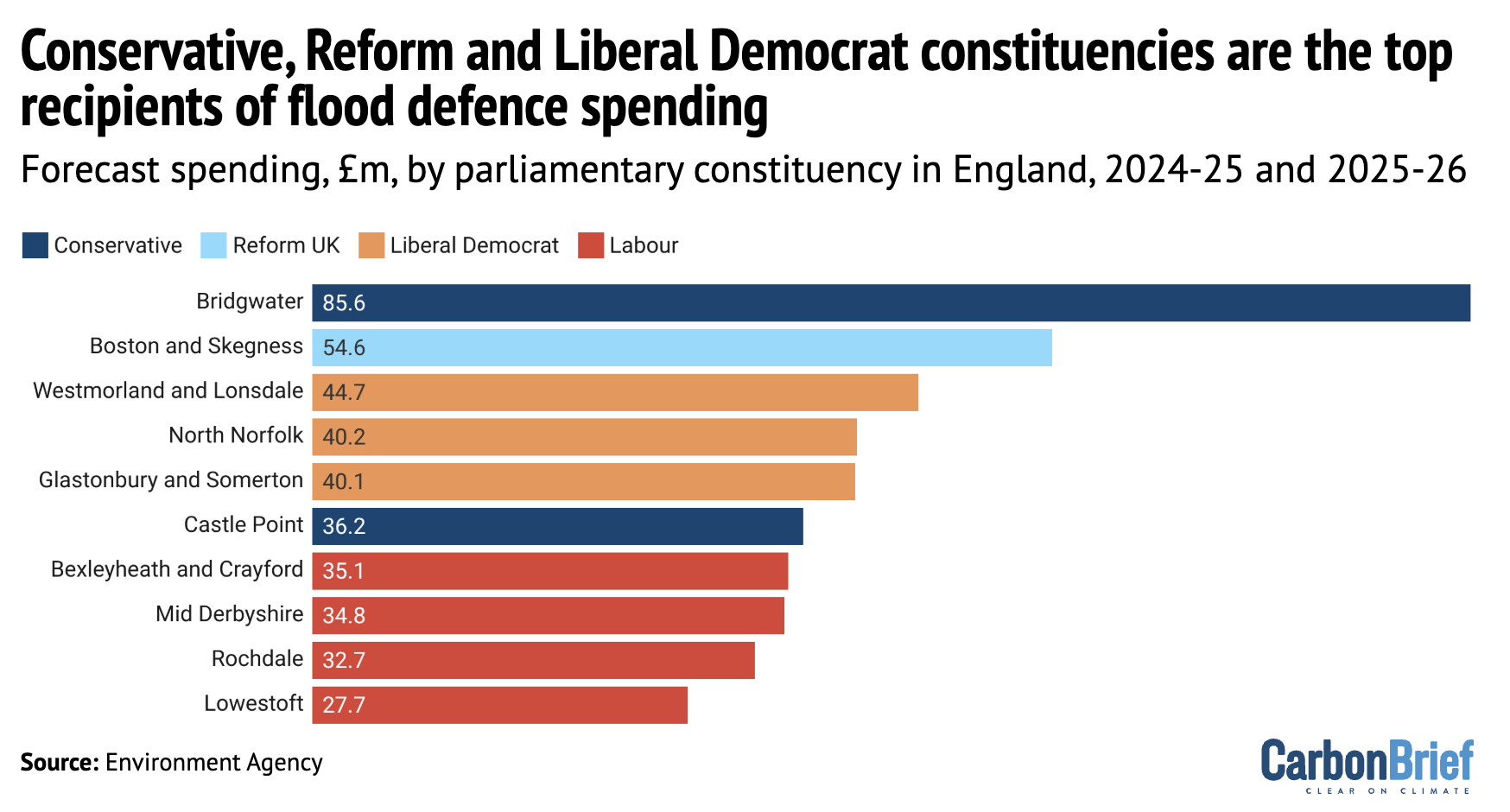
The constituency of Richard Tice MP, the climate-sceptic deputy leader of Reform UK, is the second-largest recipient of flood defence spending in England, according to new Carbon Brief analysis. Overall, the funding is disproportionately targeted at coastal and urban areas, many of which have Conservative or Liberal Democrat MPs.
Spotlight
Is there really a UK ‘greenlash’?
This week, after a historic Green Party byelection win, Carbon Brief looks at whether there really is a “greenlash” against climate policy in the UK.
Over the past year, the UK’s political consensus on climate change has been shattered.
Yet despite a sharp turn against climate action among right-wing politicians and right-leaning media outlets, UK public support for climate action remains strong.
Prof Federica Genovese, who studies climate politics at the University of Oxford, told Carbon Brief:
“The current ‘war’ on green policy is mostly driven by media and political elites, not by the public.”
Indeed, there is still a greater than two-to-one majority among the UK public in favour of the country’s legally binding target to reach net-zero emissions by 2050, as shown below.
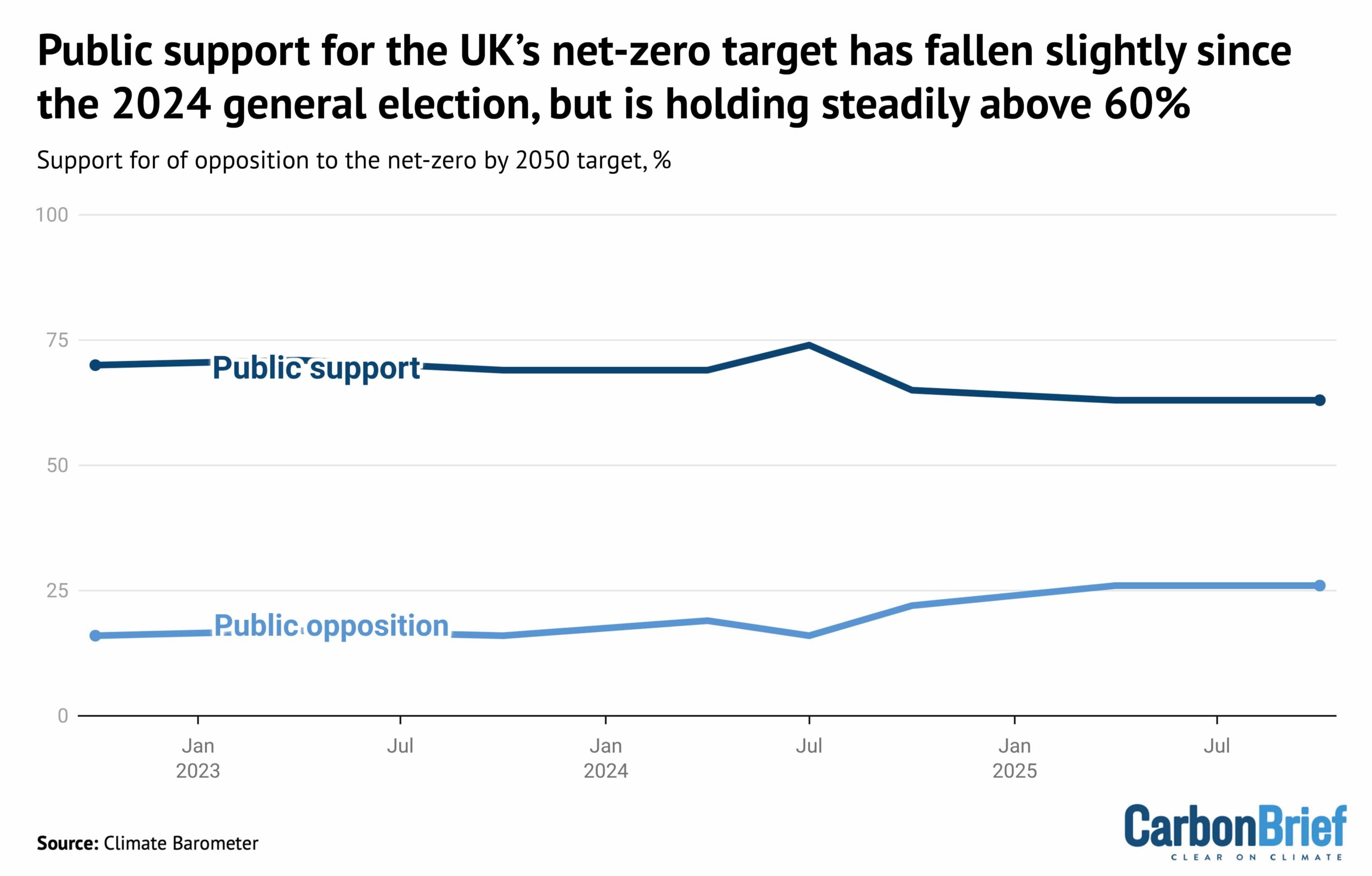
Steve Akehurst, director of public-opinion research initiative Persuasion UK, also noted the growing divide between the public and “elites”. He told Carbon Brief:
“The biggest movement is, without doubt, in media and elite opinion. There is a bit more polarisation and opposition [to climate action] among voters, but it’s typically no more than 20-25% and mostly confined within core Reform voters.”
Conservative gear shift
For decades, the UK had enjoyed strong, cross-party political support for climate action.
Lord Deben, the Conservative peer and former chair of the Climate Change Committee, told Carbon Brief that the UK’s landmark 2008 Climate Change Act had been born of this cross-party consensus, saying “all parties supported it”.
Since their landslide loss at the 2024 election, however, the Conservatives have turned against the UK’s target of net-zero emissions by 2050, which they legislated for in 2019.
Curiously, while opposition to net-zero has surged among Conservative MPs, there is majority support for the target among those that plan to vote for the party, as shown below.
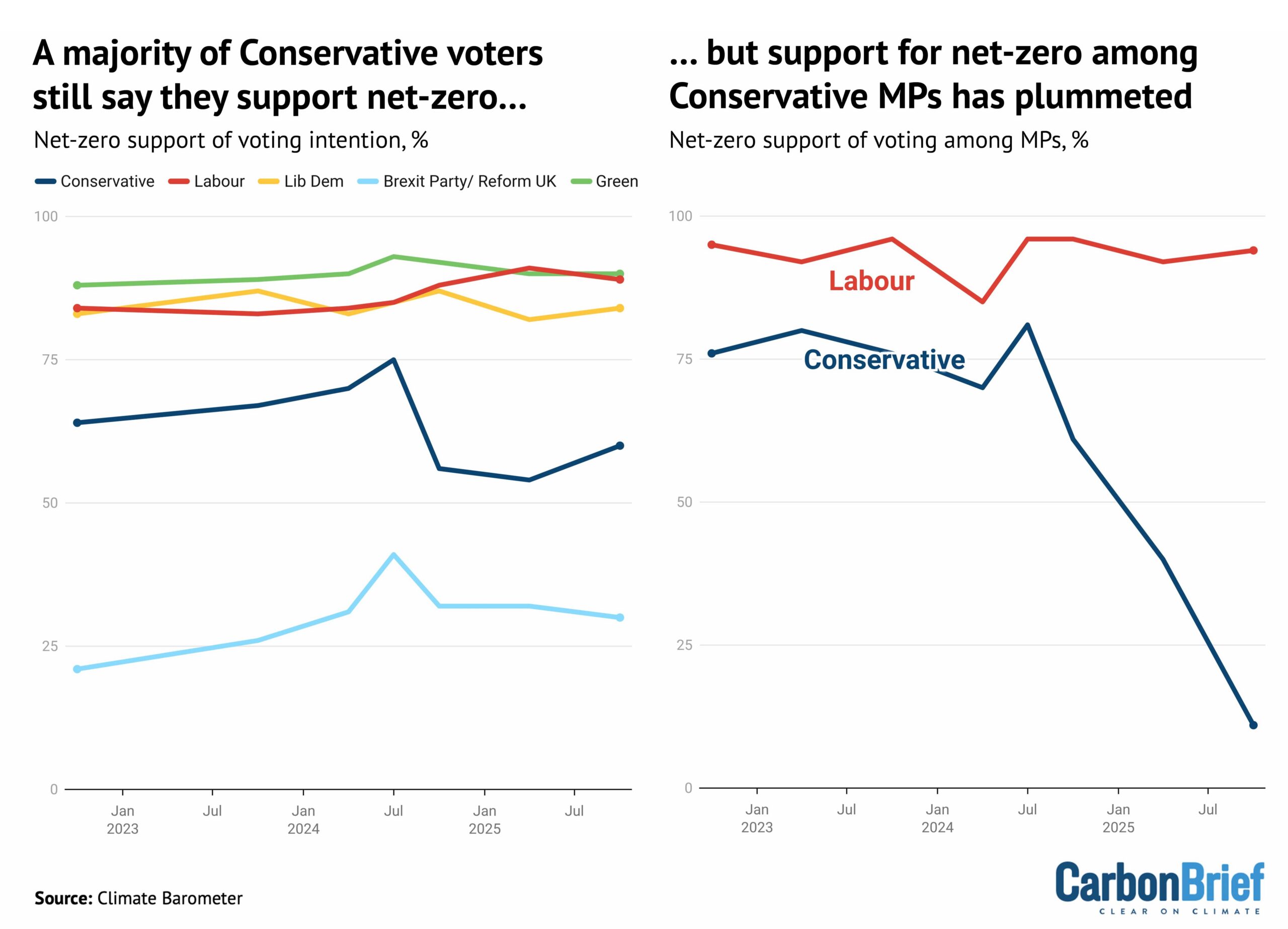
Dr Adam Corner, advisor to the Climate Barometer initiative that tracks public opinion on climate change, told Carbon Brief that those who currently plan to vote Reform are the only segment who “tend to be more opposed to net-zero goals”. He said:
“Despite the rise in hostile media coverage and the collapse of the political consensus, we find that public support for the net-zero by 2050 target is plateauing – not plummeting.”
Reform, which rejects the scientific evidence on global warming and campaigns against net-zero, has been leading the polls for a year. (However, it was comfortably beaten by the Greens in yesterday’s Gorton and Denton byelection.)
Corner acknowledged that “some of the anti-net zero noise…[is] showing up in our data”, adding:
“We see rising concerns about the near-term costs of policies and an uptick in people [falsely] attributing high energy bills to climate initiatives.”
But Akehurst said that, rather than a big fall in public support, there had been a drop in the “salience” of climate action:
“So many other issues [are] competing for their attention.”
UK newspapers published more editorials opposing climate action than supporting it for the first time on record in 2025, according to Carbon Brief analysis.
Global ‘greenlash’?
All of this sits against a challenging global backdrop, in which US president Donald Trump has been repeating climate-sceptic talking points and rolling back related policy.
At the same time, prominent figures have been calling for a change in climate strategy, sold variously as a “reset”, a “pivot”, as “realism”, or as “pragmatism”.
Genovese said that “far-right leaders have succeeded in the past 10 years in capturing net-zero as a poster child of things they are ‘fighting against’”.
She added that “much of this is fodder for conservative media and this whole ecosystem is essentially driving what we call the ‘greenlash’”.
Corner said the “disconnect” between elite views and the wider public “can create problems” – for example, “MPs consistently underestimate support for renewables”. He added:
“There is clearly a risk that the public starts to disengage too, if not enough positive voices are countering the negative ones.”
Watch, read, listen
TRUMP’S ‘PETROSTATE’: The US is becoming a “petrostate” that will be “sicker and poorer”, wrote Financial Times associate editor Rana Forohaar.
RHETORIC VS REALITY: Despite a “political mood [that] has darkened”, there is “more green stuff being installed than ever”, said New York Times columnist David Wallace-Wells.
CHINA’S ‘REVOLUTION’: The BBC’s Climate Question podcast reported from China on the “green energy revolution” taking place in the country.
Coming up
- 2-6 March: UN Food and Agriculture Organization regional conference for Latin America and Caribbean, Brasília
- 3 March: UK spring statement
- 4-11 March: China’s “two sessions”
- 5 March: Nepal elections
Pick of the jobs
- The Guardian, senior reporter, climate justice | Salary: $123,000-$135,000. Location: New York or Washington DC
- China-Global South Project, non-resident fellow, climate change | Salary: Up to $1,000 a month. Location: Remote
- University of East Anglia, PhD in mobilising community-based climate action through co-designed sports and wellbeing interventions | Salary: Stipend (unknown amount). Location: Norwich, UK
- TABLE and the University of São Paulo, Brazil, postdoctoral researcher in food system narratives | Salary: Unknown. Location: Pirassununga, Brazil
DeBriefed is edited by Daisy Dunne. Please send any tips or feedback to debriefed@carbonbrief.org.
This is an online version of Carbon Brief’s weekly DeBriefed email newsletter. Subscribe for free here.
The post DeBriefed 27 February 2026: Trump’s fossil-fuel talk | Modi-Lula rare-earth pact | Is there a UK ‘greenlash’? appeared first on Carbon Brief.
Greenhouse Gases
Analysis: Constituency of Reform’s climate-sceptic Richard Tice gets £55m flood funding
The Lincolnshire constituency held by Richard Tice, the climate-sceptic deputy leader of the hard-right Reform party, has been pledged at least £55m in government funding for flood defences since 2024.
This investment in Boston and Skegness is the second-largest sum for a single constituency from a £1.4bn flood-defence fund for England, Carbon Brief analysis shows.
Flooding is becoming more likely and more extreme in the UK due to climate change.
Yet, for years, governments have failed to spend enough on flood defences to protect people, properties and infrastructure.
The £1.4bn fund is part of the current Labour government’s wider pledge to invest a “record” £7.9bn over a decade on protecting hundreds of thousands of homes and businesses from flooding.
As MP for one of England’s most flood-prone regions, Tice has called for more investment in flood defences, stating that “we cannot afford to ‘surrender the fens’ to the sea”.
He is also one of Reform’s most vocal opponents of climate action and what he calls “net stupid zero”. He denies the scientific consensus on climate change and has claimed, falsely and without evidence, that scientists are “lying”.
Flood defences
Last year, the government said it would invest £2.65bn on flood and coastal erosion risk management (FCERM) schemes in England between April 2024 and March 2026.
This money was intended to protect 66,500 properties from flooding. It is part of a decade-long Labour government plan to spend more than £7.9bn on flood defences.
There has been a consistent shortfall in maintaining England’s flood defences, with the Environment Agency expecting to protect fewer properties by 2027 than it had initially planned.
The Climate Change Committee (CCC) has attributed this to rising costs, backlogs from previous governments and a lack of capacity. It also points to the strain from “more frequent and severe” weather events, such as storms in recent years that have been amplified by climate change.
However, the CCC also said last year that, if the 2024-26 spending programme is delivered, it would be “slightly closer to the track” of the Environment Agency targets out to 2027.
The government has released constituency-level data on which schemes in England it plans to fund, covering £1.4bn of the 2024-26 investment. The other half of the FCERM spending covers additional measures, from repairing existing defences to advising local authorities.
The map below shows the distribution of spending on FCERM schemes in England over the past two years, highlighting the constituency of Richard Tice.
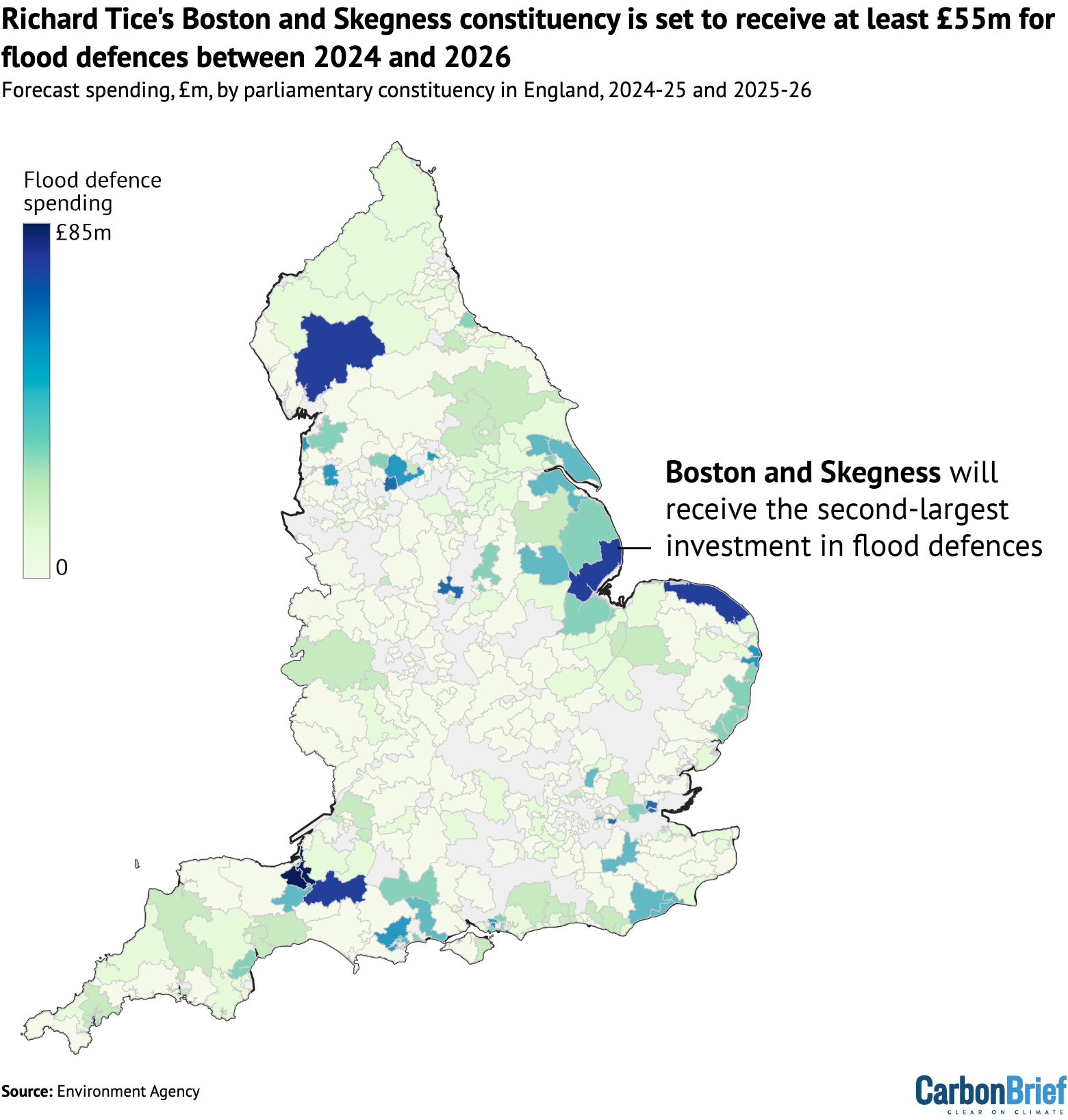
By far the largest sum of money – £85.6m in total – has been committed to a tidal barrier and various other defences in the Somerset constituency of Bridgwater, the seat of Conservative MP Ashley Fox.
Over the first months of 2026, the south-west region has faced significant flooding and Fox has called for more support from the government, citing “climate patterns shifting and rainfall intensifying”.
He has also backed his party’s position that “the 2050 net-zero target is impossible” and called for more fossil-fuel extraction in the North Sea.
Tice’s east-coast constituency of Boston and Skegness, which is highly vulnerable to flooding from both rivers and the sea, is set to receive £55m. Among the supported projects are beach defences from Saltfleet to Gibraltar Point and upgrades to pumping stations.
Overall, Boston and Skegness has the second-largest portion of flood-defence funding, as the chart below shows. Constituencies with Conservative and Liberal Democrat MPs occupied the other top positions.
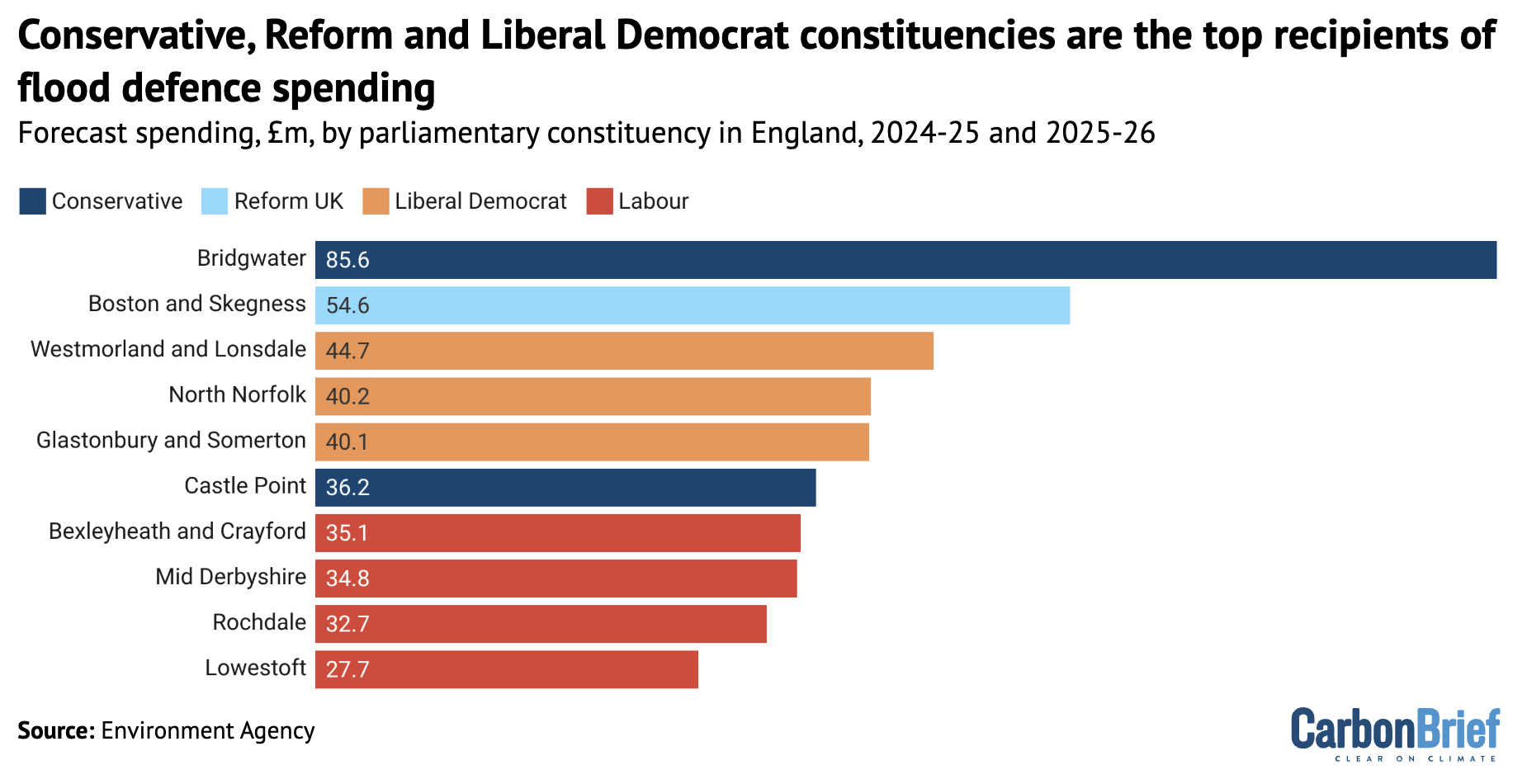
Overall, despite Labour MPs occupying 347 out of England’s 543 constituencies – nearly two-thirds of the total – more than half of the flood-defence funding was distributed to constituencies with non-Labour MPs. This reflects the flood risk in coastal and rural areas that are not traditional Labour strongholds.
Reform funding
While Reform has just eight MPs, representing 1% of the population, its constituencies have been assigned 4% of the flood-defence funding for England.
Nearly all of this money was for Tice’s constituency, although party leader Nigel Farage’s coastal Clacton seat in Kent received £2m.
Reform UK is committed to “scrapping net-zero” and its leadership has expressed firmly climate-sceptic views.
Much has been made of the disconnect between the party’s climate policies and the threat climate change poses to its voters. Various analyses have shown the flood risk in Reform-dominated areas, particularly Lincolnshire.
Tice has rejected climate science, advocated for fossil-fuel production and criticised Environment Agency flood-defence activities. Yet, he has also called for more investment in flood defences, stating that “we cannot afford to ‘surrender the fens’ to the sea”.
This may reflect Tice’s broader approach to climate change. In a 2024 interview with LBC, he said:
“Where you’ve got concerns about sea level defences and sea level rise, guess what? A bit of steel, a bit of cement, some aggregate…and you build some concrete sea level defences. That’s how you deal with rising sea levels.”
While climate adaptation is viewed as vital in a warming world, there are limits on how much societies can adapt and adaptation costs will continue to increase as emissions rise.
The post Analysis: Constituency of Reform’s climate-sceptic Richard Tice gets £55m flood funding appeared first on Carbon Brief.
Analysis: Constituency of Reform’s climate-sceptic Richard Tice gets £55m flood funding
Greenhouse Gases
Cropped 25 February 2026: Food inflation strikes | El Niño looms | Biodiversity talks stagnate
We handpick and explain the most important stories at the intersection of climate, land, food and nature over the past fortnight.
This is an online version of Carbon Brief’s fortnightly Cropped email newsletter.
Subscribe for free here.
Key developments
Food inflation on the rise
DELUGE STRIKES FOOD: Extreme rainfall and flooding across the Mediterranean and north Africa has “battered the winter growing regions that feed Europe…threatening food price rises”, reported the Financial Times. Western France has “endured more than 36 days of continuous rain”, while farmers’ associations in Spain’s Andalusia estimate that “20% of all production has been lost”, it added. Policy expert David Barmes told the paper that the “latest storms were part of a wider pattern of climate shocks feeding into food price inflation”.
-
Sign up to Carbon Brief’s free “Cropped” email newsletter. A fortnightly digest of food, land and nature news and views. Sent to your inbox every other Wednesday.
NO BEEF: The UK’s beef farmers, meanwhile, “face a double blow” from climate change as “relentless rain forces them to keep cows indoors”, while last summer’s drought hit hay supplies, said another Financial Times article. At the same time, indoor growers in south England described a 60% increase in electricity standing charges as a “ticking timebomb” that could “force them to raise their prices or stop production, which will further fuel food price inflation”, wrote the Guardian.
‘TINDERBOX’ AND TARIFFS: A study, covered by the Guardian, warned that major extreme weather and other “shocks” could “spark social unrest and even food riots in the UK”. Experts cited “chronic” vulnerabilities, including climate change, low incomes, poor farming policy and “fragile” supply chains that have made the UK’s food system a “tinderbox”. A New York Times explainer noted that while trade could once guard against food supply shocks, barriers such as tariffs and export controls – which are being “increasingly” used by politicians – “can shut off that safety valve”.
El Niño looms
NEW ENSO INDEX: Researchers have developed a new index for calculating El Niño, the large-scale climate pattern that influences global weather and causes “billions in damages by bringing floods to some regions and drought to others”, reported CNN. It added that climate change is making it more difficult for scientists to observe El Niño patterns by warming up the entire ocean. The outlet said that with the new metric, “scientists can now see it earlier and our long-range weather forecasts will be improved for it.”
WARMING WARNING: Meanwhile, the US Climate Prediction Center announced that there is a 60% chance of the current La Niña conditions shifting towards a neutral state over the next few months, with an El Niño likely to follow in late spring, according to Reuters. The Vibes, a Malaysian news outlet, quoted a climate scientist saying: “If the El Niño does materialise, it could possibly push 2026 or 2027 as the warmest year on record, replacing 2024.”
CROP IMPACTS: Reuters noted that neutral conditions lead to “more stable weather and potentially better crop yields”. However, the newswire added, an El Niño state would mean “worsening drought conditions and issues for the next growing season” to Australia. El Niño also “typically brings a poor south-west monsoon to India, including droughts”, reported the Hindu’s Business Line. A 2024 guest post for Carbon Brief explained that El Niño is linked to crop failure in south-eastern Africa and south-east Asia.
News and views
- DAM-AG-ES: Several South Korean farmers filed a lawsuit against the country’s state-owned utility company, “seek[ing] financial compensation for climate-related agricultural damages”, reported United Press International. Meanwhile, a national climate change assessment for the Philippines found that the country “lost up to $219bn in agricultural damages from typhoons, floods and droughts” over 2000-10, according to Eco-Business.
- SCORCHED GRASS: South Africa’s Western Cape province is experiencing “one of the worst droughts in living memory”, which is “scorching grass and killing livestock”, said Reuters. The newswire wrote: “In 2015, a drought almost dried up the taps in the city; farmers say this one has been even more brutal than a decade ago.”
- NOUVELLE VEG: New guidelines published under France’s national food, nutrition and climate strategy “urged” citizens to “limit” their meat consumption, reported Euronews. The delayed strategy comes a month after the US government “upended decades of recommendations by touting consumption of red meat and full-fat dairy”, it noted.
- COURTING DISASTER: India’s top green court accepted the findings of a committee that “found no flaws” in greenlighting the Great Nicobar project that “will lead to the felling of a million trees” and translocating corals, reported Mongabay. The court found “no good ground to interfere”, despite “threats to a globally unique biodiversity hotspot” and Indigenous tribes at risk of displacement by the project, wrote Frontline.
- FISH FALLING: A new study found that fish biomass is “falling by 7.2% from as little as 0.1C of warming per decade”, noted the Guardian. While experts also pointed to the role of overfishing in marine life loss, marine ecologist and study lead author Dr Shahar Chaikin told the outlet: “Our research proves exactly what that biological cost [of warming] looks like underwater.”
- TOO HOT FOR COFFEE: According to new analysis by Climate Central, countries where coffee beans are grown “are becoming too hot to cultivate them”, reported the Guardian. The world’s top five coffee-growing countries faced “57 additional days of coffee-harming heat” annually because of climate change, it added.
Spotlight
Nature talks inch forward
This week, Carbon Brief covers the latest round of negotiations under the UN Convention on Biological Diversity (CBD), which occurred in Rome over 16-19 February.
The penultimate set of biodiversity negotiations before October’s Conference of the Parties ended in Rome last week, leaving plenty of unfinished business.
The CBD’s subsidiary body on implementation (SBI) met in the Italian capital for four days to discuss a range of issues, including biodiversity finance and reviewing progress towards the nature targets agreed under the Kunming-Montreal Global Biodiversity Framework (GBF).
However, many of the major sticking points – particularly around finance – will have to wait until later this summer, leaving some observers worried about the capacity for delegates to get through a packed agenda at COP17.
The SBI, along with the subsidiary body on scientific, technical and technological advice (SBSTTA) will both meet in Nairobi, Kenya, later this summer for a final round of talks before COP17 kicks off in Yerevan, Armenia, on 19 October.
Money talks
Finance for nature has long been a sticking point at negotiations under the CBD.
Discussions on a new fund for biodiversity derailed biodiversity talks in Cali, Colombia, in autumn 2024, requiring resumed talks a few months later.
Despite this, finance was barely on the agenda at the SBI meetings in Rome. Delegates discussed three studies on the relationship between debt sustainability and implementation of nature plans, but the more substantive talks are set to take place at the next SBI meeting in Nairobi.
Several parties “highlighted concerns with the imbalance of work” on finance between these SBI talks and the next ones, reported Earth Negotiations Bulletin (ENB).
Lim Li Ching, senior researcher at Third World Network, noted that tensions around finance permeated every aspect of the talks. She told Carbon Brief:
“If you’re talking about the gender plan of action – if there’s little or no financial resources provided to actually put it into practice and implement it, then it’s [just] paper, right? Same with the reporting requirements and obligations.”
Monitoring and reporting
Closely linked to the issue of finance is the obligations of parties to report on their progress towards the goals and targets of the GBF.
Parties do so through the submission of national reports.
Several parties at the talks pointed to a lack of timely funding for driving delays in their reporting, according to ENB.
A note released by the CBD Secretariat in December said that no parties had submitted their national reports yet; by the time of the SBI meetings, only the EU had. It further noted that just 58 parties had submitted their national biodiversity plans, which were initially meant to be published by COP16, in October 2024.
Linda Krueger, director of biodiversity and infrastructure policy at the environmental not-for-profit Nature Conservancy, told Carbon Brief that despite the sparse submissions, parties are “very focused on the national report preparation”. She added:
“Everybody wants to be able to show that we’re on the path and that there still is a pathway to getting to 2030 that’s positive and largely in the right direction.”
Watch, read, listen
NET LOSS: Nigeria’s marine life is being “threatened” by “ghost gear” – nets and other fishing equipment discarded in the ocean – said Dialogue Earth.
COMEBACK CAUSALITY: A Vox long-read looked at whether Costa Rica’s “payments for ecosystem services” programme helped the country turn a corner on deforestation.
HOMEGROWN GOALS: A Straits Times podcast discussed whether import-dependent Singapore can afford to shelve its goal to produce 30% of its food locally by 2030.
‘RUSTING’ RIVERS: The Financial Times took a closer look at a “strange new force blighting the [Arctic] landscape”: rivers turning rust-orange due to global warming.
New science
- Lakes in the Congo Basin’s peatlands are releasing carbon that is thousands of years old | Nature Geoscience
- Natural non-forest ecosystems – such as grasslands and marshlands – were converted for agriculture at four times the rate of land with tree cover between 2005 and 2020 | Proceedings of the National Academy of Sciences
- Around one-quarter of global tree-cover loss over 2001-22 was driven by cropland expansion, pastures and forest plantations for commodity production | Nature Food
In the diary
- 2-6 March: UN Food and Agriculture Organization regional conference for Latin America and Caribbean | Brasília
- 5 March: Nepal general elections
- 9-20 March: First part of the thirty-first session of the International Seabed Authority (ISA) | Kingston, Jamaica
Cropped is researched and written by Dr Giuliana Viglione, Aruna Chandrasekhar, Daisy Dunne, Orla Dwyer and Yanine Quiroz.
Please send tips and feedback to cropped@carbonbrief.org
The post Cropped 25 February 2026: Food inflation strikes | El Niño looms | Biodiversity talks stagnate appeared first on Carbon Brief.
Cropped 25 February 2026: Food inflation strikes | El Niño looms | Biodiversity talks stagnate
-
Greenhouse Gases7 months ago
Guest post: Why China is still building new coal – and when it might stop
-
Climate Change7 months ago
Guest post: Why China is still building new coal – and when it might stop
-

 Greenhouse Gases2 years ago
Greenhouse Gases2 years ago嘉宾来稿:满足中国增长的用电需求 光伏加储能“比新建煤电更实惠”
-
Climate Change2 years ago
Bill Discounting Climate Change in Florida’s Energy Policy Awaits DeSantis’ Approval
-
Climate Change2 years ago
Spanish-language misinformation on renewable energy spreads online, report shows
-

 Climate Change2 years ago
Climate Change2 years ago嘉宾来稿:满足中国增长的用电需求 光伏加储能“比新建煤电更实惠”
-
Climate Change Videos2 years ago
The toxic gas flares fuelling Nigeria’s climate change – BBC News
-

 Carbon Footprint2 years ago
Carbon Footprint2 years agoUS SEC’s Climate Disclosure Rules Spur Renewed Interest in Carbon Credits




